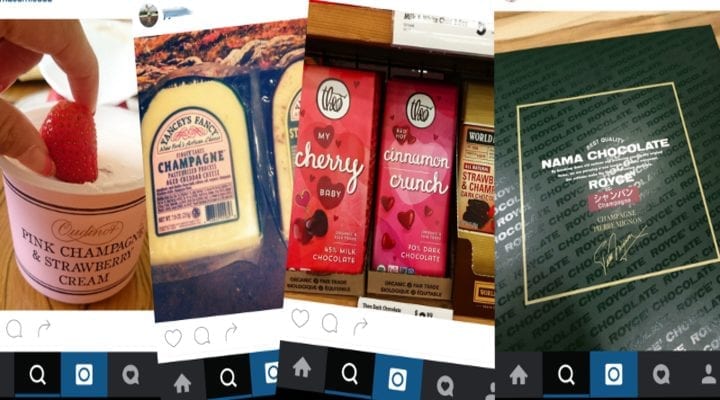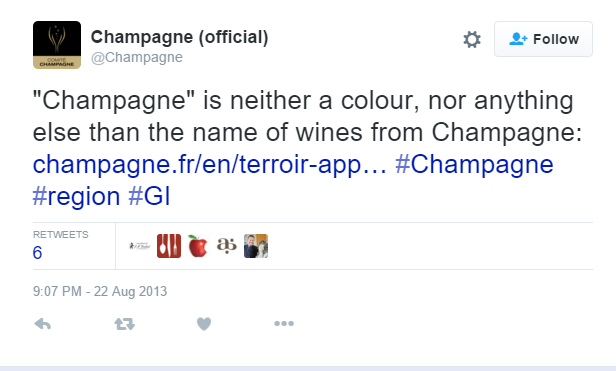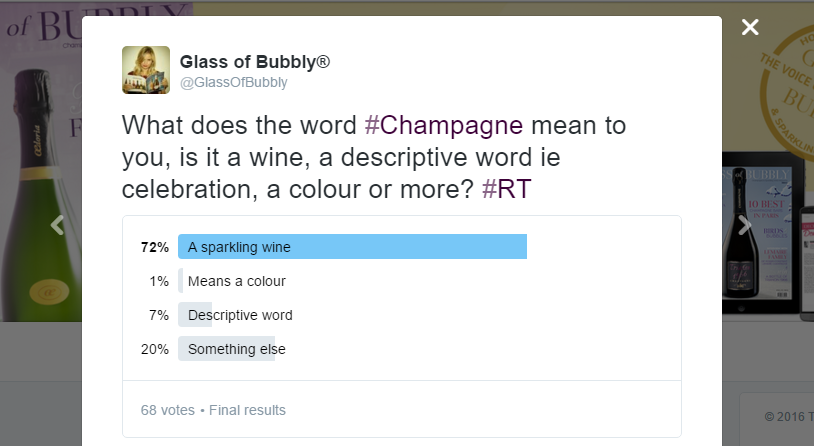The usage of the word Champagne legally and illegally
22nd February 2016

A Tweet back in 2013 from the official Champagne Twitter account told us:
“Champagne is neither a colour, nor anything else than the name of wines from Champagne”…
… and this is a topic that keeps many people interested and debating, both for and against… I thought I would take a brief look in to the subject of Champagne and how we should be using the word.
A good place to start is by looking at what the official Champagne website says, an interesting page can be viewed here where they show how they are protecting the name from misuse internationally.
Glass of Bubbly placed a poll out on Twitter asking the industry and consumers what their thoughts were on the word Champagne and what it meant to them, results showed that a majority think of Champagne as a sparkling wine with 72% of the 66 votes:
I must say that for me, the word Champagne mostly means the sparkling wine that we are all familiar with that originates from the Champagne region of France (I am forever correcting people these days that confuse another wine for a Champagne or ask me if the Champagne I am drinking is French Champagne – I am sure you get the same things occurring). It also means for me a celebration or success and I would also use it for terms such as ‘that was a Champagne moment‘ or similar, but of course this still directs us back to the word meaning Champagne the sparkling wine as for many of us the reason to enjoy Champagne is for celebrations, success, special moments – I am not sure we are quite there yet for a special moment to be an English Sparkling Wine moment or a Cremant of Alsace moment? I would rarely use it as a colour, but I do see it being used that way especially for make-up descriptions and arts / craft materials / colours.
What does Wikipedia say when you search for Champagne?
“Champagne is a sparkling wine produced from the Champagne region grape grown in France following rules that demand, among other things, secondary fermentation of the wine in the bottle to create carbonation, specific vineyard practices, sourcing of grapes exclusively from specific parcels in the Champagne appellation and specific pressing regimes unique to the region. Some use the term Champagne as a generic term for sparkling wine, but in most countries, it is illegal to officially label any product Champagne unless it both comes from the Champagne region and is produced under the rules of the appellation.”
When you search through history, ie when I search through Google, there does appear many results showing Champagne vs usage of the word, or even champagne vs usage of the word for ‘should there be a capital C for the word or shouldn’t there‘ also conjures up another debate. What is for sure though is that this is not just a recent thing where Official Champagne are looking to protect their name, this is something that has been around for years. The word Champagne means to many a luxury and quality sparkling wine drink and indeed the word Champagne is the actual official ‘business name‘ should we say for the product, just like Ferrari is to the car industry or Rolex is to the watch industry (as a collector of Rolex watches, I wonder what is thought about the Date Adjust Oyster Rolex with Champagne Dial)! I do agree that we can not simply add the word Champagne to anything we wish, even if not associated with sparkling wine as I am sure Ferrari and Rolex would also argue the case if similar happened to them. These days with the internet, you can learn a lot about Official Champagne and rules and regulations as the Champagne Bureau put more time in to representating themselves clearer online and in terms that are easier and engaging for consumers up to industry professionals. I was very appreciative of a recent educational tour that the CIVC invited Glass of Bubbly to in order to learn more about Champagne and importantly what the CIVC are doing to protect the values of the brand and maintain its status within the world of wine.
I suppose that is why we chose the name ‘Glass of Bubbly’ for our business, knowing that we were not only going to promote Champagne, but we were also going to mention other sparkling wines, we needed a name that associated all sparkling wines – I think if we chose ‘Glass of Champagne’ then we’d have not been in many good books. Many in the industry would have followed Champagne Jayne’s case with the CIVC of recent years… Again, many against CIVC and many understanding fully their reasoning.
Social Media can really show us how Champagne is being used in not just the Bubbly that comes from the Champagne region:
The above are examples from Instagram showcasing products using the word Champagne to market their products, these are easy to find by simply searching for #Champagne which is used in their descriptions (though note you may have to do a bit of searching as the hashtag #Champagne has been used 5,422,618 times already in postings)!
Big names in the world of business do not get away with using the word Champagne either, cases have been brought on those big names who chose to use Champagne in titles of their products, ie Apple’s iPhone 5S Champagne coloured model or Unilever’s Andrélon Shampoo.
The usage of Champagne / Champagnoise method wording in USA / Canada is another big topic in these discussions as we can find the name being used in sparkling wines out there. “The agreement was signed in 2003, giving Canadian producers 10 years to phase out names such as Chablis, Champagne, Port and Sherry“. The CIVC is working hard to get the law enforced internationally with more and more countries signing up to respecting their wishes and protecting the name Champagne. Though big names in sparkling wine can still, apparently, get their facts mixed up, ie this video of a Korbel Winemaker on a TV show:
The right thing to do is of course, if you are not sure, to ask and CIVC will of course welcome such an approach – It is far better to establish if your name is legally acceptable rather than going full steam ahead and incurring costs such as branding / name / trademarks and then having to lose them, just like you checking beforehand your domain name online, your name if it is available on social media or registering your business name etc. Many companies have and will no doubt see cases against them, from flooring to café bars.
So it would be wise to remember that it is just not the confusion between Champagne and Sparkling Wines that is addressed by the CIVC, but also protecting the name as a whole being used in any other business product, name, description or other. If it is seen that the wording being used is not soley to showcase the sparkling wines from the Champagne region then it would be safe to say that you will at some point attract attention from both CIVC and within the industry. Of course, I have no opinion in the legal aspects, but I would agree that protecting a business name, registered trademark etc is a serious business and can only be seen as a positive thing within the Champagne & Sparkling Wine industry… I have heard that Prosecco are going down a similar route to protect themselves going forward.
Best way to sum up would be to say that “a Prosecco is not a Champagne in a way that a Casio is not a Rolex… Champagne is a brand itself just as much as BurgerKing or Manchester United is“
![]()
Glass of Bubbly
Executive editor of news content for the website Please enjoy the articles that we share - We hope you find our love for Champagne & Sparkling Wines both interesting and educational.



